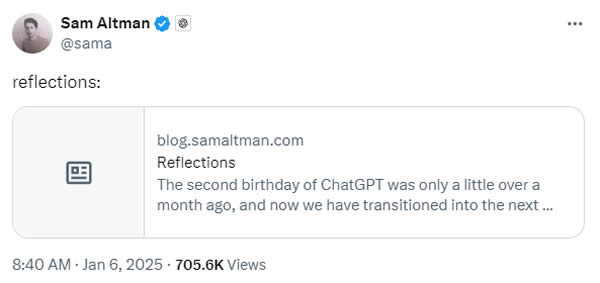The AI Workforce Is Coming: What Sam Altman’s Vision Means for the Future

Artificial intelligence is leaping forward at an astonishing pace, and according to OpenAI CEO Sam Altman, we’re on the brink of something groundbreaking—AI agents officially joining the workforce. But what does this mean for businesses, workers, and the future of artificial general intelligence (AGI)? Let’s dive into this transformative moment and what it could mean for all of us.
AI Agents: The Newest Members of the Workforce
Altman recently shared in his blog post, Reflections, that 2025 could mark the year when the first AI agents enter the workforce in a way that materially impacts business operations.
But first, what exactly are AI agents? Unlike traditional AI, which requires prompts and human intervention to function, AI agents act independently, making decisions and executing complex tasks with minimal oversight. Think of them as virtual employees who can handle projects, problem-solve, and even multitask—without the need for coffee breaks.
Nvidia CEO Jensen Huang echoed this sentiment, highlighting enterprise adoption of AI agents as a rising trend. In his recent earnings call, he mentioned that businesses are starting to see real value in AI-driven automation. The consensus? AI isn’t just assisting humans anymore; it’s actively participating in—and revolutionizing—the workplace.
OpenAI’s AGI Ambitions: A Step Closer to Superintelligence
Beyond AI agents, OpenAI continues its march toward creating artificial general intelligence (AGI)—a level of AI that mimics human-like reasoning, problem-solving, and learning.
“We are now confident we know how to build AGI as we have traditionally understood it,” Altman stated.
This confidence signals a major shift. AGI has long been considered a distant goal, but if companies like OpenAI truly know how to build it, we may be on the precipice of AI that not only performs specialized tasks but can reason, plan, and adapt the way a human does.
The endgame? Superintelligence. Altman believes that once AGI is achieved, the next step is developing AI systems that surpass human intelligence in every measurable way. He envisions these technologies accelerating scientific discoveries, unlocking new avenues of innovation, and reshaping economies on an unprecedented scale.
 ChatGPT, OpenAI
ChatGPT, OpenAI
Blog post on AI agents and AGI development. Source: Sam Altman
The AI Boom Continues
If 2024 was a year of AI making big strides, 2025 could be the year AI truly transforms how businesses operate. The introduction of ChatGPT already sent shockwaves through industries—from customer service to content creation—and the rise of AI agents will only intensify that shift.
Anthropic CEO Dario Amodei added fuel to the fire, suggesting that we could see human-level AI capabilities as soon as 2026. If that timeline holds, we might be staring down a future where AI collaborators are as common as human coworkers.
One thing is clear—AI’s rapid evolution isn’t slowing down. We’re entering a new chapter where AI doesn’t just assist humanity; it actively contributes to its progress. Whether that excites you or makes you uneasy, one thing is certain: the world as we know it is about to change forever.
Final Thoughts
So, what should we take away from all this? AI isn’t just some futuristic concept anymore—it’s here, evolving, and integrating into our daily lives faster than we ever imagined. With AI agents on the horizon and AGI within reach, we’re stepping into a world where artificial intelligence is more than just a tool; it’s a true collaborator.
The key question remains—are we ready for it? Let us know your thoughts! Would you work alongside an AI agent, or does the idea of AI in the workforce give you pause? Drop your opinions in the comments!
Related: AI models predict the ultimate crypto portfolio for 2025
Magazine: A bizarre cult is growing around AI-created memecoin ‘religions’: AI Eye

